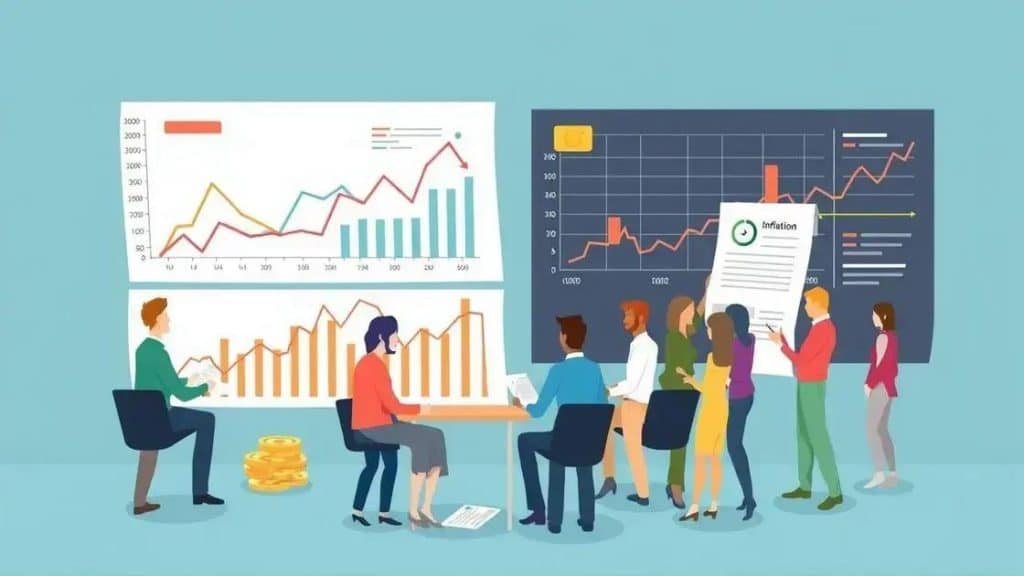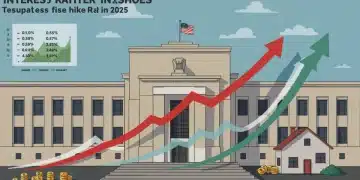Least inflation insights: understanding the current economy

Inflation decreases purchasing power, meaning that as prices rise, individuals need to adjust their budgeting and investment strategies to protect their financial stability.
Least inflation insights can offer valuable guidance in today’s fluctuating economy. Have you felt the pinch at the store? Let’s dive into key strategies that help you navigate these changes and secure your financial future.
Understanding inflation trends
Understanding inflation trends is crucial in today’s economic climate. Inflation influences everything from prices at the grocery store to interest rates on loans. By recognizing how inflation trends work, you can make more informed financial decisions.
What Factors Influence Inflation?
Inflation is mainly driven by supply and demand dynamics. When the demand for goods and services exceeds supply, prices rise, leading to inflation. Other factors include:
- Monetary policy: Central banks adjust interest rates to control inflation.
- Economic growth: A booming economy can lead to increased consumer spending.
- Production costs: Higher costs to produce goods can push prices up.
It’s important to stay informed about how these elements interact and affect inflation. For instance, when production costs increase due to supply chain disruptions, it can lead to immediate price hikes in the market.
Effects of Inflation on Daily Life
Inflation impacts your daily expenses and savings. As prices rise, you might notice that your purchasing power is decreasing. This means you can buy less with the same amount of money. For example, if inflation is at 3%, a $100 grocery bill this year will cost you $103 next year. To counteract this, consider adopting smart shopping habits and adjusting your budget accordingly.
Moreover, understanding inflation trends helps you plan for the future. For instance, if inflation is expected to rise, you might consider investing in assets that typically retain their value, like real estate or certain stocks. Making well-informed decisions during inflationary times is critical for maintaining financial stability.
Additionally, watching for signs of inflation can provide insights into the broader economy. High inflation may prompt changes in government policy, affecting employment, wages, and overall economic growth.
Investing time to understand inflation trends can arm you with the knowledge to navigate your financial landscape better. By keeping an eye on these trends, you can position yourself to adapt to changes before they significantly impact your finances.
Impact of inflation on purchasing power
The impact of inflation on purchasing power is significant and often felt by everyone. When inflation rises, the value of money decreases. This means that what you could buy for a set amount of money last year may cost more this year. Understanding this connection can help you manage your finances better.
How Inflation Affects Prices
Inflation causes the prices of goods and services to rise. If your income doesn’t increase at the same rate as inflation, you may find it harder to afford the same items. For example, if the price of groceries rises by 5%, while your salary only increases by 2%, your purchasing power effectively decreases. To cope, many people adjust their spending habits.
- Buying less: When prices rise, consumers may buy fewer products or choose cheaper alternatives.
- Changing preferences: Shoppers might avoid luxury items and focus on essentials.
- Delaying purchases: Some may hold off on buying big-ticket items, waiting for sales or better prices.
Over time, persistent inflation can lead to changes in behavior. People start to budget differently, prioritizing necessary expenses over wants. This shift can create a ripple effect on the economy, influencing demand for various products and services.
Strategies to Maintain Purchasing Power
To counteract the effects of inflation, consider several strategies. First, focusing on savings is advisable. By putting money into an interest-bearing account or investing in assets like stocks or real estate, you can grow your wealth at a pace that can keep up with inflation.
Another way to maintain your purchasing power is by continually assessing your expenses. Look for opportunities to cut costs, whether that means using coupons, shopping during sales, or finding alternative brands that provide the same quality at a lower price.
Finally, staying informed about economic trends can make a huge difference. Understanding how inflation influences prices and your purchasing power will help you make better financial decisions.
Effective budgeting during inflation

Effective budgeting during inflation is essential for maintaining financial stability. As prices rise, it becomes increasingly important to track your spending carefully. By adjusting your budget, you can ensure that your money stretches further, even when costs are climbing.
Review Your Income and Expenses
The first step in effective budgeting is understanding your current financial situation. Take a close look at your income and how much you spend each month. Identify necessary expenses, such as rent, utilities, and groceries. You might find ways to cut back on non-essential expenses.
- Identify fixed costs: These are expenses that stay the same each month, like rent or subscriptions.
- Track variable expenses: Keep an eye on spending that can fluctuate, like dining out or entertainment.
- Evaluate discretionary spending: Look for areas where you can reduce costs without sacrificing too much enjoyment.
By knowing where your money goes, you can create a budget that reflects your needs during inflationary times.
Set Realistic Goals
When budgeting during inflation, setting achievable financial goals is crucial. Based on your income and expenses, decide how much you can allocate for savings, essentials, and discretionary spending. For instance, you may want to prioritize building an emergency fund, especially when prices are unpredictable.
Additionally, consider adjusting your budget monthly. For example, you might decide to save more one month if you expect certain expenses to decrease. Flexible budgeting helps you respond to changes without feeling overwhelmed.
Utilize Budgeting Tools
Using budgeting tools can make it easier to track your finances. Many apps and online platforms are available that help you organize your spending and visualize your budget. Features such as alerts for overspending can keep you on track.
Moreover, setting realistic monthly goals through these tools allows for quick adjustments. By keeping your budget structured but flexible, you can better navigate the challenges presented by inflation.
Investing wisely amid inflation
Investing wisely amid inflation is essential for protecting your financial future. When prices rise, your investments need to work harder to keep up with the cost of living. Understanding how to navigate this scenario can help you make informed decisions.
Consider Inflation-Resilient Assets
One effective strategy is to focus on assets that traditionally hold their value during inflation. These can include:
- Real Estate: Property often appreciates over time, making it a solid long-term investment.
- Commodities: Things like gold and oil can act as a hedge against inflation since their prices may rise with inflation.
- Stocks: Companies that have strong pricing power can pass on costs to consumers, maintaining their profit margins during inflationary periods.
By allocating funds to these types of assets, you can create a more resilient portfolio.
Diversify Your Portfolio
Diversification is another key aspect of investing wisely. It helps spread risk across different investment types. If one area of your portfolio suffers due to inflation, others may still perform well. A balanced mix might include:
- Equities: Invest in a variety of stocks across sectors and geographies.
- Bonds: Consider bonds with inflation protection, such as Treasury Inflation-Protected Securities (TIPS).
- Mutual Funds or ETFs: These can provide exposure to a range of assets and help diversify your risk.
When creating a diversified portfolio, consider how each investment might react to inflation. This thoughtful approach can lead to better overall performance.
Monitor Economic Indicators
Staying informed about economic indicators is crucial for making wise investment decisions. Watch for changes in interest rates, employment data, and consumer price indices. When these indicators signal rising inflation, you’ll know it’s time to adjust your investments.
For instance, if interest rates rise, it might indicate that the Federal Reserve is trying to combat inflation. This could affect bond prices negatively but might signal opportunities in equities with strong fundamentals.
By being proactive and adjusting your investment strategies based on current economic conditions, you can better maneuver through inflationary periods. Investing wisely allows you to not only protect your financial assets but also capitalize on opportunities that may arise in the market.
Predictions for future inflation
Predictions for future inflation can help individuals and businesses make better financial decisions. Understanding potential inflation trends allows you to prepare for what lies ahead and adjust your budgets or investments accordingly. Economic forecasts often rely on various indicators that signal changes in inflation.
Economic Indicators to Watch
Several key indicators can provide insights into future inflation trends. Monitoring these can give you an idea of where inflation is heading. Important indicators include:
- Consumer Price Index (CPI): A measure that examines the average change in prices over time for a basket of consumer goods and services.
- Producer Price Index (PPI): This index measures the average changes in selling prices received by domestic producers for their output.
- Employment Rates: High employment generally leads to increased consumer spending, which can drive prices up.
Keeping an eye on these factors can help you anticipate inflation changes and adapt your financial strategies effectively.
Expert Forecasts
Many economists and financial institutions provide forecasts for future inflation based on current trends and data analysis. These predictions can vary, but they often suggest general trends. Experts may use models that incorporate historical data, recent events, and global economic influences.
For example, if the economy is recovering from a recession quickly, inflation can rise as consumer demand outpaces supply. Understanding these dynamics can assist you in making timely financial choices.
Long-Term Considerations
While short-term fluctuations are common, focusing on long-term trends may provide a clearer picture of inflation over time. Many analysts suggest that inflation will gradually rise over the next few years due to factors such as government fiscal policies and increases in production costs.
Investing in inflation-protected assets can be a wise decision. The key to successfully navigating future inflation is adaptability and maintaining awareness of economic trends.
In conclusion, understanding the impact of inflation on purchasing power is essential for effective budgeting and investment. By monitoring economic indicators and staying informed, you can adapt your financial strategies accordingly. Investing wisely amid inflation can help safeguard your assets. As you plan for the future, keep an eye on expert predictions and consider inflation-resistant options. Being proactive in adjusting your financial approach can ensure that you navigate these economic challenges successfully.
FAQ – Frequently Asked Questions about Inflation Insights
What is the relationship between inflation and purchasing power?
Inflation decreases purchasing power, meaning that you can buy less with the same amount of money as prices rise over time.
How can I effectively budget during inflation?
Review your income and expenses, identify areas to cut costs, and create a flexible budget that adapts to changing prices.
What assets should I consider investing in during inflation?
Consider investing in real estate, commodities like gold, and stocks from companies with strong pricing power to hedge against inflation.
How can I stay updated on future inflation predictions?
Monitor economic indicators such as the Consumer Price Index (CPI) and follow expert forecasts from reliable financial institutions or economists.





